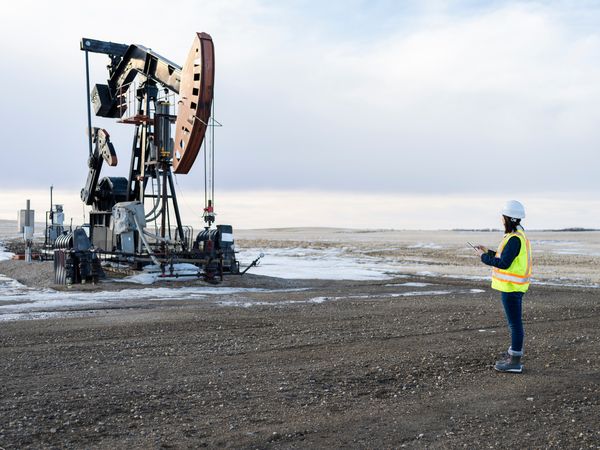Schlumberger's (SLB 0.44%) management team recently spent an hour with analysts and investors on a conference call to discuss the company's first-quarter results. In addition to discussing those results, the management team also spent a great deal of time discussing what it's seeing in the oil market. Here are five things Schlumberger's CEO said about the industry that really stood out.
Unprecedented slowdown
CEO Paal Kibsgaard spent a lot of time on the conference call talking about the current downturn. One of his more interesting comments was about the speed at which things went south:
The pace and magnitude of the activity reductions, particularly in North America, has been almost unprecedented, and we have to go back to the mid-1980s to find anything similar. And while we thought we had adequate plans in place going into the quarter, activity declined even faster than expected, which required us to revise our plans accordingly. This made managing the quarter challenging.
Kibsgaard notes that the market worsened beyond its own expectations. This forced the company to quickly revise its plans, including the announcement of a new round of layoffs as it works to cut costs.
Unsustainable market pricing for services
In addition to how fast the oil market went from bad to worse, Kibsgaard noticed that some of his peers were acting irrationally:
[...] market pricing for certain products and services has already reached unsustainable levels; however, we are being selective in the pursuit of market share, and very disciplined in the avoidance of loss making contracts.
Some of Schlumberger's peers have cut their prices so steeply that they're basically working at cash break-even, or even at a loss just to stay busy. This was something Halliburton (HAL 0.81%) noticed as well. Both companies view this practice as unsustainable and are therefore being very disciplined by focusing on running their businesses at a profit even as others are not.
Industry's greatest challenge
Kibsgaard then turned his attention to other issues within the industry. One issue in particular is the fact that costs in general had gotten out of control as oil companies were being weighed down by high-cost projects that weren't producing economic returns, even at triple-digit oil prices. Because of this Kibsgaard noted:
[...] the current financial challenges will not disappear, even if oil prices were to recover to the levels seen in recent years. The industry is therefore forced to seek new ways of working together to reduce costs and create more project value. And we have seen a much closer collaboration between operators and large service companies, as a significant opportunity to create technical solutions that will achieve these objectives.
While high oil prices will improve the cash flow of oil companies, it won't solve all of their problems. Instead, the industry really needs to work together to create new solutions to bring down the costs of mega projects, like deepwater projects, to create more value out of them. Schlumberger hopes to be a big part of that solution.
Outlook on oil-field service activity
Looking a bit more near term, Kibsgaard also provided his outlook for industry activity levels in 2015:
[...] visibility still remains limited. However, we expect [2015 capex in North America to be] down by more than 30%. We further believe that a recovery in U.S. land drilling activity will be pushed out in time, as the inventory of uncompleted wells builds, and [...] anticipate that our recovery in North America land activity will fall well short of reaching previous levels, hence extending the period of weak pricing.
Both Schlumberger and Halliburton don't have a whole lot of visibility in 2015, as neither is sure when oil and gas drilling activity will improve. Further, both believe that when a recovery does come, it will be a bit more muted because of the large inventory of wells that have been drilled, but not completed. While that's just deferring revenue, it will still slow the pace of the recovery, at least initially, while the overall view is that it will be quite a while before activity reaches a new peak.
Macro thoughts
Kibsgaard then turned his attention to a more macro view of the oil market in general at the request of an analyst on the call:
So our view on the macro hasn't really changed, compared to what we said both on the October and January call. First of all, the 2015 oil demand remains strong [...] It would now be about 1.1 million barrels per day [higher than 2014]. While on the supply side, we continue to see the market share battle playing out globally [...] So based on this, as we said in January, we expect the global supply to continue to tighten in the second half of this year, so really no major change to our view on the macro.
Everything in the oil market is basically playing out as the company expected it would. Demand growth for oil is much stronger than last year, as lower oil prices are spurring incremental demand. Meanwhile, oil supplies are tightening as reduced investment, especially in North America, is leading to less robust production growth, with the potential for declining production in the U.S. in the second half of this year. That's stabilizing oil prices at the moment and could lead to an improvement in pricing by the end of the year.
Investor takeaway
Right now, times are tough. The downturn has been faster than expected, which is causing some oil-field service providers to act irrationally. Moreover, there are still issues remaining as the cost structure in the industry needs to be fixed, and a recovery is still not yet on the horizon. That said, the overall oil market is healing itself -- slowly but surely.







